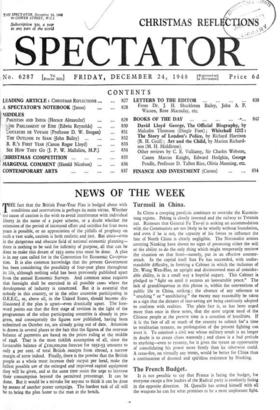Turmoil in China.
In China a creeping paralysis continues to overtake the Kuomin- tang regime. Peking is closely invested and the railway to Tientsin cut. Rumours that General Fu Tso-yi is seeking an accommodation with the Communists are not likely to be wholly without foundation, and even if he is not, the capacity of his forces to influence the fate of North China is clearly negligible. The Nationalist armies covering Nanking have shown no signs of possessing either the will or the ability to do the only thing which might temporarily retrieve the situation on that front—namely, put in an effective counter- attack. In the capital itself Sun Fo has succeeded, with under- standable difficulty, in forming a Cabinet in which the inclusion of Dr. Wong Wen-Hao, an upright and disinterested man of consider- able ability, is in a small way a hopeful augury. This Cabinet is pledged to " fight on until it secures an honourable peace." The lack of grandiloquence in this phrase is, within the conventions of public life in China, striking ; the absence of any reference to " crushing " or " annihilating" the enemy may reasonably be taken as a sign that the dictates of face-saving are being cautiously adopted to conform with realities. The plain fact is, as has been urged more than once in these notes, that the most urgent need of the Chinese people at the present time is a cessation of hostilities. If it is the fate of all or much of the country to submit for' a time to totalitarian tyranny, no prolongation of the present fighting can avert it. To continue a civil war whose military result is no longer in doubt is to create chaos wantonly ; and chaos is a bad prelude to anything—even to tyranny, for it gives the tyrant an opportunity of consolidating his power more firmly than he otherwise could. A cease-fire, on virtually any terms, would be better for China than a continuation of doomed and spiritless resistance by Nanking.


































